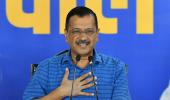In more trouble for the city's ruling Aam Aadmi Party, the Central Bureau of Investigation and the Enforcement Directorate told the Supreme Court on Monday they are contemplating making the party an accused in the corruption and money laundering cases linked to the scrapped Delhi excise policy.

Additional Solicitor General SV Raju, representing the two probe agencies, told a bench of Justices Sanjiv Khanna and SVN Bhatti he has instructions to state that the agencies are considering making AAP an accused, invoking legal provisions on "vicarious liability" under the anti-corruption law and section 70 of the Prevention of Money Laundering Act.
"I want to make a statement I have received instructions to make. We are contemplating making the Aam Aadmi Party an accused and invoking offences of vicarious liability under the Prevention of Corruption Act and section 70 of the PMLA," Raju told the court.
However, the bench asked Raju to clarify his stand on Tuesday on whether there will be separate charges against the AAP in the cases being probed by the CBI and the ED.
Raju said charges in corruption and money laundering cases will be different but for the same offence.
"Be careful and take specific instructions and tell us tomorrow on whether there will be same charge or different charge with respect to these cases," Justice Khanna told Raju.
The ASG made the statement while the bench was hearing the bail pleas of AAP leader and former Delhi deputy chief minister Manish Sisodia, who was arrested in the excise policy cases being probed by the CBI and ED.
Senior AAP leader and Rajya Sabha MP Sanjay Singh has also been arrested in connection with the excise policy cases and is currently in jail.
The bench also asked senior advocate Abhishek Singhvi, appearing for Sisodia, to answer legal questions on Tuesday on the CBI's allegation that change in excise policy led to a loss to the state exchequer.
"We want you to answer on the allegation of the CBI that the changes in policy was done for unjust enrichment of A, B and C at state exchequer's expense and consumers were made to pay higher price," the bench told Singhvi.
The senior lawyer said he will answer all the questions put forth by the bench but the ASG's statement on making AAP an accused will have an impact on Tuesday's newspapers and it has been made for this purpose.
Raju opposed Singhvi's contention.
At the outset, the bench made it clear that putting questions to the probe agencies does not mean the court has concluded its findings and that it only wants to elicit a proper response from them.
"In an interactive court, we ask questions for our understanding," Justice Khanna told Raju, adding he does not understand why people think the questions are conclusions of the court.
The investigative agencies have often suggested that AAP was a beneficiary of the kickbacks received from stakeholders who got liquor licences as part of a quid pro quo.
They have alleged the AAP used the money for campaigning in the Goa assembly elections.
On October 4, the top court, while hearing the bail pleas of Sisodia had asked the ED to explain why the political party (Aam Aadmi Party), which was allegedly the beneficiary of the Delhi excise policy 'scam', has not been made an accused in the money laundering case.
The ED has claimed the AAP used Rs 100 crore received as kickback from various stakeholders for its campaign in the 2022 Goa assembly elections.
However, the very next day when Singhvi objected to the question posed by the court saying it had made headlines in the newspapers of October 5, the bench clarified it had only asked a "legal question" from the ED about AAP not being made an accused in the case despite being an alleged beneficiary.
"We asked questions based on the arguments advanced before the court. We asked the question not to implicate anybody. It was purely a legal question which arose from the fact that if 'A' is beneficiary of the proceeds of crime, then why it is not made an accused while 'B' and 'C' are made accused," Justice Khanna had said.











 © 2025
© 2025